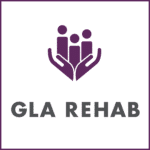Following a traumatic event, such as a car accident, an individual might be experiencing emotional disturbances along with physical and/or cognitive difficulties.
Many might experience depression, post-traumatic stress, anxiety, anger and frustration. They might be thinking, “Why did this happen to me?” and might be fearful of getting back into a car and driving again. They worry about their future and their ability to participate in everyday life.
The road to acceptance and coping often takes a multi-disciplinary approach in rehabilitation. At GLA, the full rehab team of the OT/case manager, social worker and/or psychologist, PT and rehab support worker work together to accomplish this goal.
This month’s success story comes from a client who was diagnosed with Post-Traumatic Stress Disorder following a car accident and had difficulty integrating back into society. With the assistance of his rehab team, they were able to explore meaningful activities and found a passion and love for YOGA.
When the rehab team first suggested trialing yoga with the RSW, the client was hesitant as he had never tried it before and was not sure that he can “buy” into this idea. However, he agreed to try it and to participate. Following his first session of beginner yoga with the RSW, the rest was history.
The client registered for a community Yoga class with the RSW.
Along with the physical benefits of yoga including increased flexibility, toning of muscles, balance, posture and core strengthening, yoga also has many psychological benefits.
Some of these benefits include:
- Stress reduction
- Inner peace and calm
- Improved self-confidence
- Increased emotional stability
- Less anxiety and depression
- Increased body awareness and acceptance
- Decline in self-destructive patterns
Yoga postures are a form of meditation, which help “calm the mind” and present a state of relaxation. As the body relaxes, the breath naturally becomes balanced. And when the breath becomes balanced, the mind relaxes.
A 2001 study in the Indian Journal of Physiology and Pharmacology showed that participants who practiced yoga consistently for 10 months were less anxious and depressed both during and after their months of yoga practice.
In addition, studies by Dr. Davidson at the University of Wisconsin have shown that the prefrontal cortex shows heightened activity, a finding that has been correlated with increased levels of happiness.
The client initially participated in the yoga classes with his RSW once per week. As he began to develop a better understanding of the practice and benefits, he started to initiate yoga classes on his own. Not only was he going to the classes on his own, he was making friends and becoming more social. He reports sleeping better, eating better and felt generally happier.
It is currently 2 years post-accident and he is attending yoga class 2-3 times per week. When he cannot get to his yoga class, he is able to practice his poses at home. He is exploring a return to work plan with his OT and plans on attending a yoga retreat shortly.
Yoga has been around for over 5000 years! And it has grown in popularity in the past several years. Make sure you try yoga this New Year or offer it to your clients, and experience the many benefits it has to offer!


